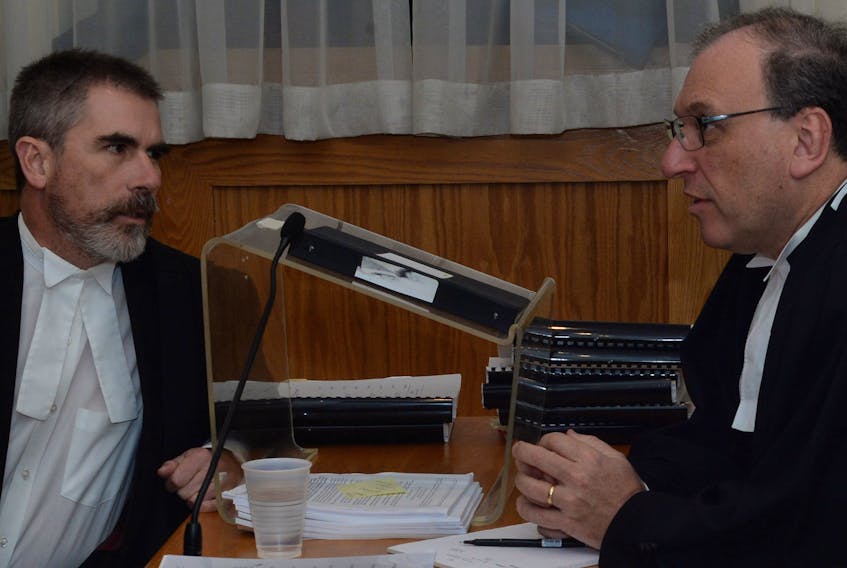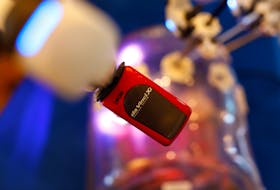ST. JOHN'S, N.L. — A long-dead parish priest and the question of his responsibility to address sexual abuse of boys at the Mount Cashel orphanage several decades ago dominated the room at the Newfoundland and Labrador Supreme Court of Appeal as the case clewed up Friday.
The lawyer for the church suggested it would be unfair to sully the reputation of the priest — who like the abuse victims cannot be named due to a publication ban — as having done nothing or too little
Back and forth, the three justices — Lois Hoegg, Francis O’Brien and Chief Justice Deborah Fry — quizzed Toronto lawyer Mark Frederick about it.
The parish priest lived at the orphanage, but had a separate entrance and only tended to the boys’ spiritual needs, the church insists, nor did he have control over the Christian Brothers.
It is known that the priest was told inside and outside the confessional of incidents of sexual abuse.
Frederick insisted that sometime after one such report of sexual abuse in the 1950s, two Christian Brothers left the orphanage.
That was countered with the fact sexual and physical abuse continued at the orphanage.
There was also some discussion Friday about the Christian Brothers’ “stellar reputation” of a bygone era and how that fit into the tone of the time and how it affected the believability and understanding of the boys’ reports of sexual abuse.
At the same time the Christian Brothers had that reputation, the abuse went on. (The case also involves a civilian employee of the orphanage.)
“The stellar reputation wasn’t shared by those who really mattered, and those were the boys,” Ottawa advocacy lawyer Eugene Meehan said during his final arguments Friday.
Meehan is co-counsel with St. John’s lawyer Geoff Budden on the appeal of the decision by Justice Alphonsus Faour, who found the Roman Catholic Episcopal Corp. — the legal entity of the local Catholic church — not liable for sexual abuse of the Mount Cashel boys of several decades ago by certain Christian Brothers.
Frederick, one of three Toronto lawyers who represents the Roman Catholic Episcopal Corp. of St. John’s, said the Christian Brothers, as set out in 1875, had the freedom to operate independently in Newfoundland, and the archdiocese had no right to interfere in the orphanage’s operations.
There was a separate chain of command the Christian Brothers followed through the lay order's own hierarchy, he said.
“They ran their own show and that never changed,” Frederick said, insisting the fact the land originated from the archbishop was a red herring, as it was only a symbol of the archdiocese helping out.
The archbishop supported lots of Catholic causes, he said.
“If (the archbishop) supports the Catholic hospital, he all of a sudden becomes responsible for the surgeon’s knife?” Frederick asked.
He referred to the Christian Brothers who abused the boys as bad apples among a group perceived in 1950s St. John’s as “good guys.”
Therefore, said Frederick, the modern-day #MeToo Movement — which Meehan referred to Thursday when saying one report of sexual abuse should have been enough for the church to act — is inappropriate hindsight when applied to the long-ago era.
“The Brothers were left to their own devices. … There wasn't widespread knowledge of abuse at that time,” Frederick said.
“(The John Does' lawyers) are looking at things through a cloudy prism,” he said.
“They are making innocent people responsible for people who did bad things.”
The parish priest, said Frederick, is obviously not around to tell the court whether he understood what the boys told him about the abuse and what he did or didn’t do about it.
“Did he have the duty to report it to the archbishop or not?” Fry asked Frederick.
“He had a duty to report it to the superior at the orphanage,” Frederick replied.
Frederick told the court not to confuse the acts of abuse with the information.
“It's hard because it’s nasty stuff,” he said.
Hoegg noted the abused boys went to the priest “hoping for a last chance.”
Frederick insisted no one really knows exactly what he did and didn’t do about it, and that’s the problem — so he can’t be said to have breached a duty of care.
Meehan said the clerical collar — worn by Christian Brothers and priests — was viewed by children as a sign someone could be trusted, and so they lowered their guard.
“That someone was a man of God,” Meehan said.
Whether they trusted them or not, the boys were captive in the orphanage and “whether they pulled up the covers” didn’t seem to matter, Hoegg said.
Meehan said church reform can’t happen without civil sanction and damages.
As a “postscript,” Meehan said while the boys — now elderly men — continue to await justice, one of the abusers is in a Christian Brothers facility with a magnificent view of the Hudson River in New York State. Ronald Lasik, who served time for his crimes, is also on the New York sex offender registry.
The Mount Cashel sexual abuse scandal is most associated with the abuse of boys of a different era, the 1970s and ’80s — the scandal that prompted the 1989-90 Hughes Inquiry. That era was not part of this civil case, and the boys from earlier decades were not part of compensation from the provincial government when it settled a block of cases from the 1970s and ’80s more than 20 years ago.
Four test-case John Does represented more than 60 claimants from the era of the late 1940s to 1960s who said the church should be held liable for the abuse they suffered at the hands of certain Christian Brothers. The case also affects the unresolved cases of about 20 others represented by various lawyers.
Commenting on the end of the appeal case, Episcopal Corp. lawyer Chris Blom said only that the matter is in the hands of the court.
Budden said both sides had a good hearing.
“The judges were obviously very engaged with the legal and other issues involved,” Budden said in a statement.
“We know that these appellate judges will take the appropriate time to consider all the arguments made and the material filed — which amounted to almost 6,000 pages filed at the Court of Appeal alone.”
The civil trial was heard in 2016 and Faour’s decision came out in March 2018.
Related link:









